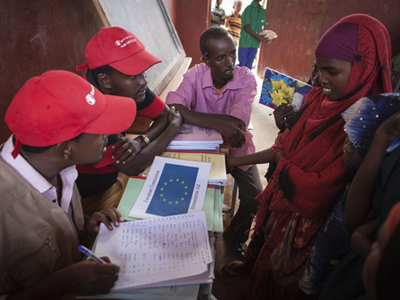Build Local Capacity; MDG
DEVEX PARTNERSHIPS FORUM IN NAIROBI
4 ways iNGOs can help develop local capacity

Volunteers for Save the Children in Ethiopia. The use of local organizations to deliver aid has increasingly been at the top of the development agenda. Photo by:ECHO / Save the Children / CC BY-ND
The use of local organizations to deliver aid has increasingly been at the top of the international development agenda. A recent workshop at Devex International Development Partnerships Forum in Nairobi has given donor organizations and local NGOs a valuable opportunity to exchange ideas and experiences of local capacity development and reinforced the need for a paradigm shift in relationships between international and local.
The theme of the workshop was “sustainability,” defined by Janet Mawiyoo, CEO of Kenya Community Development, as ensuring local organizations have the resources and skills to continue operating after the iNGO’s project has ended, rather than simply acting as a vehicle for delivering aid.
Here are four ways iNGOs can help their local partners build their capacity and become sustainable institutions in their own right.
1. Partner with the right people
It is important to have a good starting point from which local NGOs can develop, the importance of a solid reputation, as well as employing people with the right skills was mentioned several times during the workshop.
One participant recalled receiving a request from the Kenya Association of Manufacturers for help expanding their operations outside Nairobi.
“We don’t usually give money to projects like this,” he said, “but we saw they had a track record of transparency and good governance so we decided to help them. Now they have self-sustaining offices in several cities throughout Kenya.”
2. Expand NGO’s skill base
RTI International’s Volkan Cakir told the workshop: “People are the most important thing, you have to build up the skills base of local NGOs if they’re going to be sustainable.These skills are particularly important when dealing with the boards of local NGOs.”
Harriet Kongin of Act! mentioned the importance of helping boards oversee their organizations.
“You have to ask, are you supporting the board?” she said.
For an organization to last beyond the end of its involvement with an iNGO, the board must be actively supported and helped alongside the main project.
3. Build structures for sustainability
Using the example of the African Population and Health Research Center, Joseph Gichuru pointed to its effective, sustainable structures as a cause of its ongoing success.
“Accountability is a key success factor,” he said, “We know where every penny goes and have regular audits.”
Local NGOs need structures like these in order to continue operating after their international partners have left, but those international partners can provide them with the benefit of their experience in building those structures, as the APHRC found.
4. Find local solutions
At the same time, it is also important to recognize existing capacity within local NGOs.
“Donors should help the administrative systems of local NGOs but they should also work with existing local systems if they are working,” Harriet Kongin commented.
Other participants also expressed concerns that iNGOs should not swallow up their local partners or attempt to do their jobs for them as this would decrease the benefits of partnering with local organizations.
Instead, as the panelists agreed, iNGOs need to focus on the organisations they are working with and not just the projects they are undertaking.
“INGOs need to move to a demand agenda, allowing local NGOs to set the agenda,” Kongin added,
This agenda extend beyond the maximum five-year period that an iNGO may be involved for, and it is important that international organizations treat this time as a true partnership, understanding where they can support, but not disrupting the local group’s agenda. The input local organizations need, according to Mawiyoo, involves “a level playing field and a realistic understanding of the local NGO.”


Comments
Post a Comment